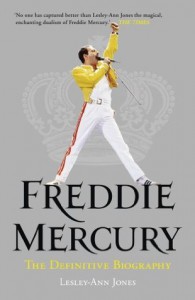Freddie Mercury: The Definitive Biography
 Reads like a People Magazine article
Reads like a People Magazine articleMaybe it's because I read Somebody to Love by Mark Langthorne first, but I didn't enjoy this biography as much as his. Somebody to Love was written without bias, without agenda, with the intent to put forth as factual a book a possible, and it was interwoven with the history and progression of the AIDS virus along with the history and progression of Queen. I left that biography fully informed of the man, the myth, and the legend, as much as anyone could know the intimidate thoughts of such a private person. But then there's this biography...
Bohemian Rhapsody was written by an award winning rock journalist, and it drew heavily on interviews with people that were within the band's entourage, as well as the hangers on in Freddie's personal life. What you find is that everyone interviewed apparently had their own agenda for speaking, often to make sure they set the record straight with previous rumors. It sometimes seemed very petty, especially when it came to the disagreements over who was with Freddie in his final moments. I didn't feel like I learned anything new with this biography. Maybe had I read it first I'd prefer it, but it seems telling that of all the people interviewed, his band mates, Mary and his parents seemed to have had the least involvement. The biographer makes Mary sound cold for evicting the occupants of Garden Lodge, but you have to wonder if it's because everyone seemed out for their fifteen minutes of fame after Freddie died, books popping up left and right, everyone except Mary who honored the star's wish for privacy and has kept all interviews to a minimum. Even the band had little to do with Mercury pals after his death, quite possibly for the same reason?
As with any biography, it is impossible to know what's truly accurate information, but the author did seemingly try to provide a fully rounded view of what Freddie, the man, and Freddie, the frontman was like. No easy feat for such a private individual who shared his talents with the world, but kept his private life private.
I can say that I left this biography still enamored with Mercury, and I am satisfied that any pertinent information needed to understand his genius has been provided between the two biographies I've read. Some people are meant to die early in order to cement their legendary status: Kurt Cobain, Jimmy Hendrix, Michael Jackson, and Freddie Mercury. Ultimately I am glad that an entirely new generation is being introduced to the legend. He is still missed.
 1
1




